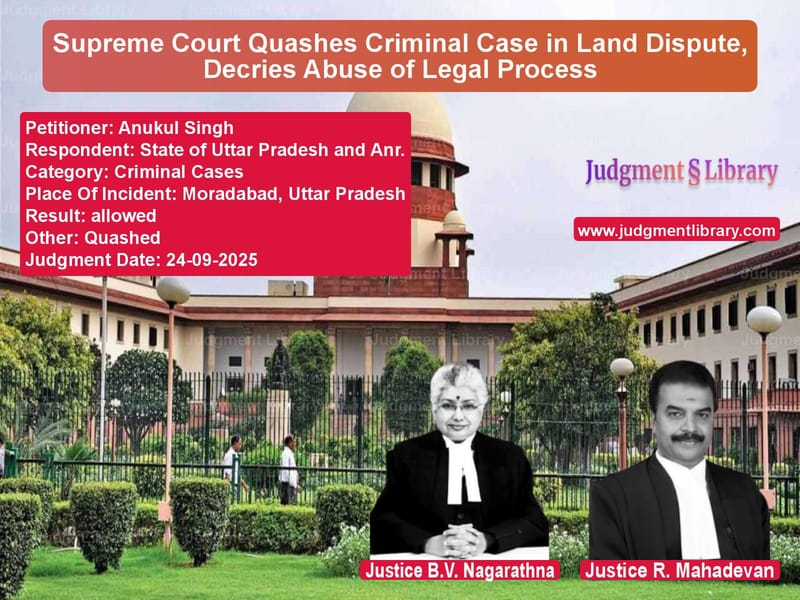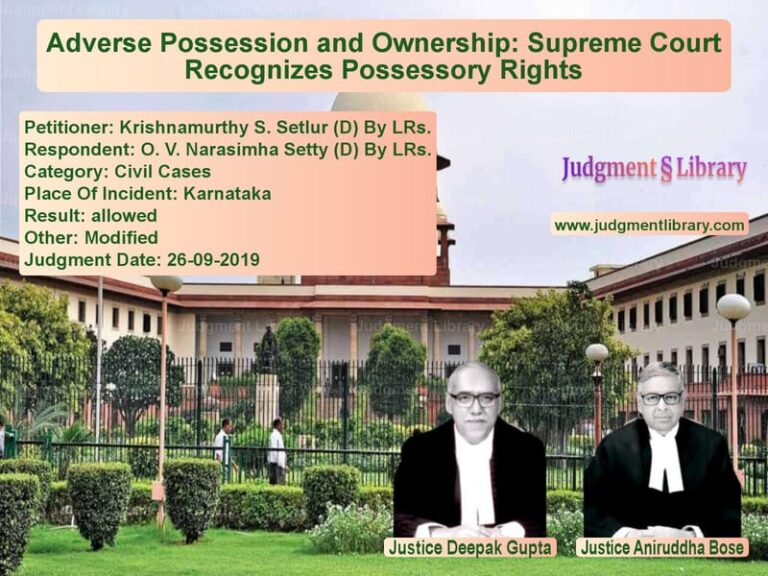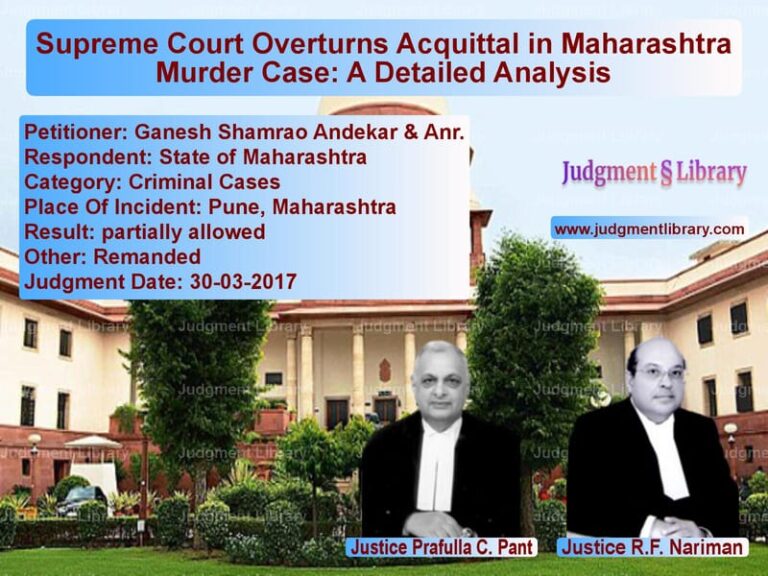Supreme Court Quashes Criminal Case in Land Dispute, Decries Abuse of Legal Process
In a significant judgment that reinforces the boundaries between civil disputes and criminal offenses, the Supreme Court has quashed criminal proceedings against a man accused of cheating and forgery, finding that the case was a malicious attempt to convert a civil land dispute into a criminal matter. The judgment, delivered on September 24, 2025, serves as a strong reminder that criminal law cannot be used as a tool for settling civil scores or wreaking vengeance.
The case involved Anukul Singh, who had been facing criminal proceedings since 2003 for offenses under Sections 420 (cheating), 467 (forgery of valuable security), and 468 (forgery for purpose of cheating) of the Indian Penal Code. The dispute originated from a land purchase made by Singh’s father, who bought 8.592 hectares of land in Village Sherpur Mafi, District Moradabad, from one Akil Hussain through a registered sale deed dated August 9, 2000. After the purchase, when Singh’s father applied for mutation of the property, the Shaher Imam of Bilari filed objections claiming the land was being used for Qurbani (religious sacrifice). The Tehsildar rejected these objections and directed mutation in favor of Singh’s father.
The appellant’s counsel argued that “the FIR dated 05.02.2003 and the charge sheet dated 16.04.2003 are a gross abuse of the process of law. Even if the allegations in the FIR are taken at their face value, they disclose at best a civil dispute for which the complainant ought to have sought redressal before the appropriate civil court.” They contended that the present FIR was a counterblast to an earlier FIR (No. 120/2002) that Singh had filed against the complainant, in which the complainant himself had been arrested. The counsel also pointed out that Singh had instituted complaint cases under Section 138 of the Negotiable Instruments Act against the complainant for dishonor of cheques, and the complainant had since been convicted in those proceedings.
The appellant’s legal team placed strong reliance on the landmark case of State of Haryana v. Bhajan Lal, particularly paragraph 102(7), which holds that “proceedings manifestly attended with mala fide, or maliciously instituted with an ulterior motive for wreaking vengeance due to private or personal grudge, are liable to be quashed.” They argued that the case fell squarely within this category.
On the other side, the State’s counsel defended the proceedings, arguing that “upon lodging of FIR dated 05.02.2003 in Case Crime No. 47 of 2003, under Sections 420, 467 and 468 IPC, Police Station Bilari, District Moradabad, the matter was duly investigated. After collecting sufficient material, the Investigating Officer submitted charge sheet No. 65/2003 on 16.04.2003 against the appellant herein.” The State contended that any defense of the accused was a matter for trial and could not be considered at the stage of quashing proceedings.
The State’s counsel relied on Md. Allauddin Khan v. State of Bihar, where the Court observed: “In our view the High Court had no jurisdiction to appreciate the evidence of the proceedings under of the Code of Criminal Procedure, because whether there are contradictions or/and inconsistencies in the statements of the witnesses is essentially an issue relating to appreciation of evidence and the same can be gone into by the Judicial Magistrate during Trial when the entire evidence is adduced by the parties.”
The Supreme Court bench comprising Justice B.V. Nagarathna and Justice R. Mahadevan conducted a thorough analysis of the legal principles governing the exercise of inherent powers under Section 482 of the Criminal Procedure Code. The Court noted that while the High Court possesses wide inherent jurisdiction, “such power is not unbridled or unlimited, but circumscribed by self-imposed restraints evolved through judicial pronouncements.”
The Court extensively discussed the Bhajan Lal case, which laid down illustrative categories where quashing of proceedings is justified. These include situations “Where the allegations made in the first information report or the complaint, even if they are taken at their face value and accepted in their entirety do not prima facie constitute any offence or make out a case against the accused” and “Where a criminal proceeding is manifestly attended with mala fide and/or where the proceeding is maliciously instituted with an ulterior motive for wreaking vengeance on the accused and with a view to spite him due to private and personal grudge.”
The Supreme Court emphasized that “the cumulative principles that emerge are: while the jurisdiction under Section 482 Cr.P.C is extraordinary and must be exercised sparingly, it is the duty of the High Court to intervene where continuation of criminal proceedings would amount to an abuse of process of law, or where the dispute is purely of a civil nature and criminal colour has been artificially given to it.”
Applying these principles to the facts, the Court found that “the record reveals that within a short span, as many as eight FIRs were registered against the appellant.” The allegations in the present FIR concerned a loan transaction where the complainant claimed he had approached Singh for a loan of Rs. 2,00,000 but was advanced only Rs. 1,40,000 and was compelled to execute an agreement to sell. The Court noted that “Even if accepted in entirety, these allegations disclose, at best, a civil dispute and do not prima facie constitute the essential ingredients of the criminal offences alleged.”
The Court found significant weight in the appellant’s argument that the FIR was a retaliatory measure, noting that “The present FIR was lodged nearly three months after the filing of the Section 138 complaint and seven months after FIR No. 120/2002.” The mala fide nature of the complaint was further supported by the fact that the complainant had been convicted under Section 138 of the Negotiable Instruments Act by the trial court.
The Supreme Court strongly deprecated the tendency to convert civil disputes into criminal proceedings, citing Indian Oil Corporation v. M/s. NEPC India Ltd., where it was held that “criminal law cannot be used as a tool to settle scores in commercial or contractual matters, and that such misuse amounts to abuse of process.” The Court reproduced extensive paragraphs from this judgment, including the observation that “While on this issue, it is necessary to take notice of a growing tendency in business circles to convert purely civil disputes into criminal cases. This is obviously on account of a prevalent impression that civil law remedies are time consuming and do not adequately protect the interests of lenders/creditors… Any effort to settle civil disputes and claims, which do not involve any criminal offence, by applying pressure though criminal prosecution should be deprecated and discouraged.”
The Court also referenced its recent decision in Shailesh Kumar Singh v. State of Uttar Pradesh, where it cautioned that “Money cannot be recovered, more particularly, in a civil dispute between the parties by filing a First Information Report and seeking the help of the Police. This amounts to abuse of the process of law.”
Ultimately, the Supreme Court concluded that “the dispute – concerning repayment of loan money and the alleged coercion in execution of documents – is purely civil in character. The essential ingredients of cheating or forgery are not prima facie made out. The institution of multiple FIRs in quick succession, particularly after the appellant had already initiated lawful proceedings, reinforces the inference of mala fides.”
The Court set aside the High Court’s judgment and quashed the FIR and consequential charge sheet, while clarifying that “This judgment, however, shall not preclude the parties from pursuing civil remedies as may be available to them in accordance with law.”
This judgment serves as an important precedent in distinguishing between civil wrongs and criminal offenses, and reinforces the principle that the criminal justice system should not be misused for settling personal scores or civil disputes. It provides much-needed protection for individuals facing malicious prosecution and underscores the judiciary’s role in preventing abuse of legal process.
Petitioner Name: Anukul Singh.Respondent Name: State of Uttar Pradesh and Anr..Judgment By: Justice B.V. Nagarathna, Justice R. Mahadevan.Place Of Incident: Moradabad, Uttar Pradesh.Judgment Date: 24-09-2025.Result: allowed.
Don’t miss out on the full details! Download the complete judgment in PDF format below and gain valuable insights instantly!
Download Judgment: anukul-singh-vs-state-of-uttar-prade-supreme-court-of-india-judgment-dated-24-09-2025.pdf
Directly Download Judgment: Directly download this Judgment
See all petitions in Fraud and Forgery
See all petitions in Cheque Dishonour Cases
See all petitions in Property Disputes
See all petitions in Legal Malpractice
See all petitions in Judgment by B.V. Nagarathna
See all petitions in Judgment by R. Mahadevan
See all petitions in allowed
See all petitions in Quashed
See all petitions in supreme court of India judgments September 2025
See all petitions in 2025 judgments
See all posts in Criminal Cases Category
See all allowed petitions in Criminal Cases Category
See all Dismissed petitions in Criminal Cases Category
See all partially allowed petitions in Criminal Cases Category







